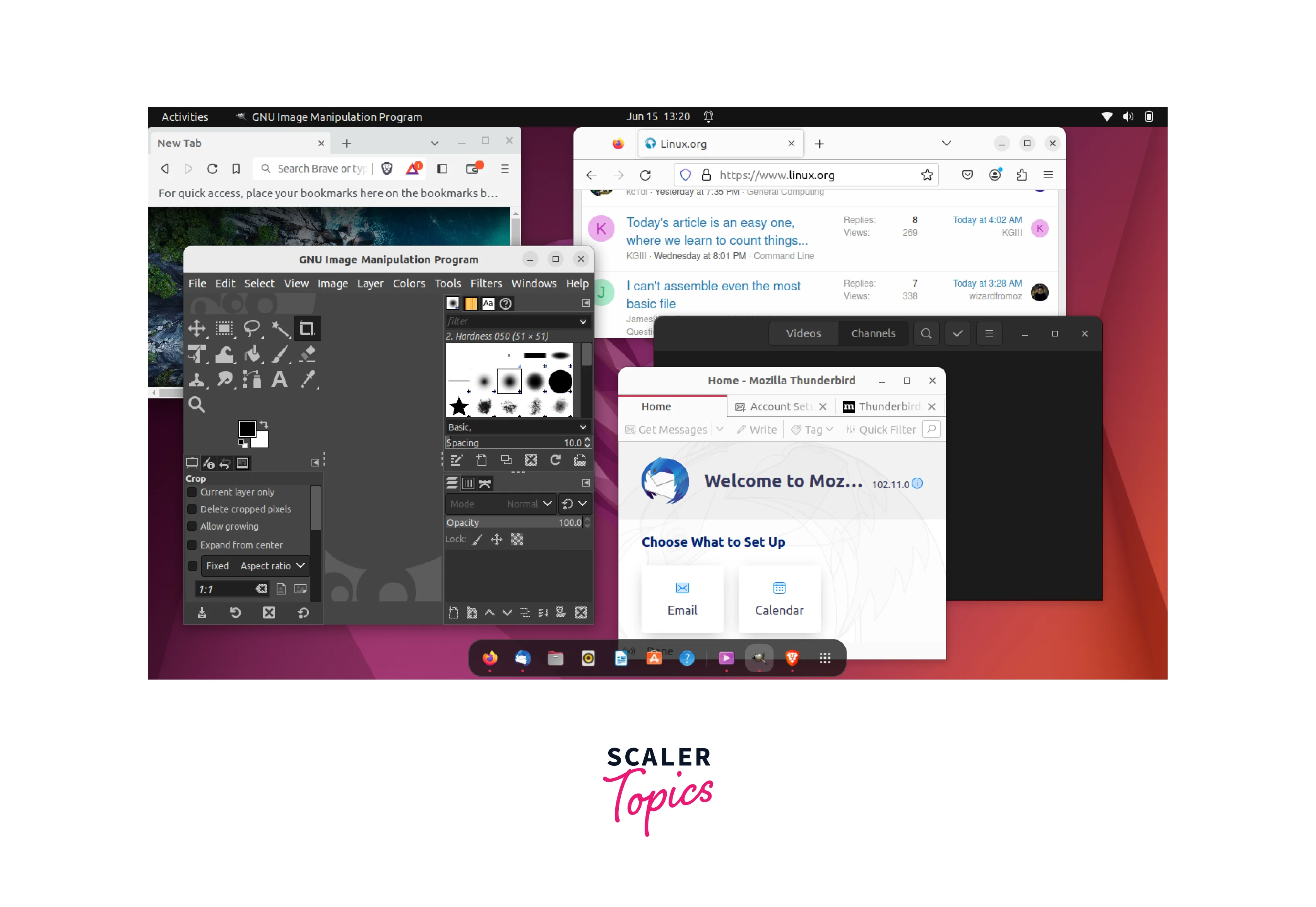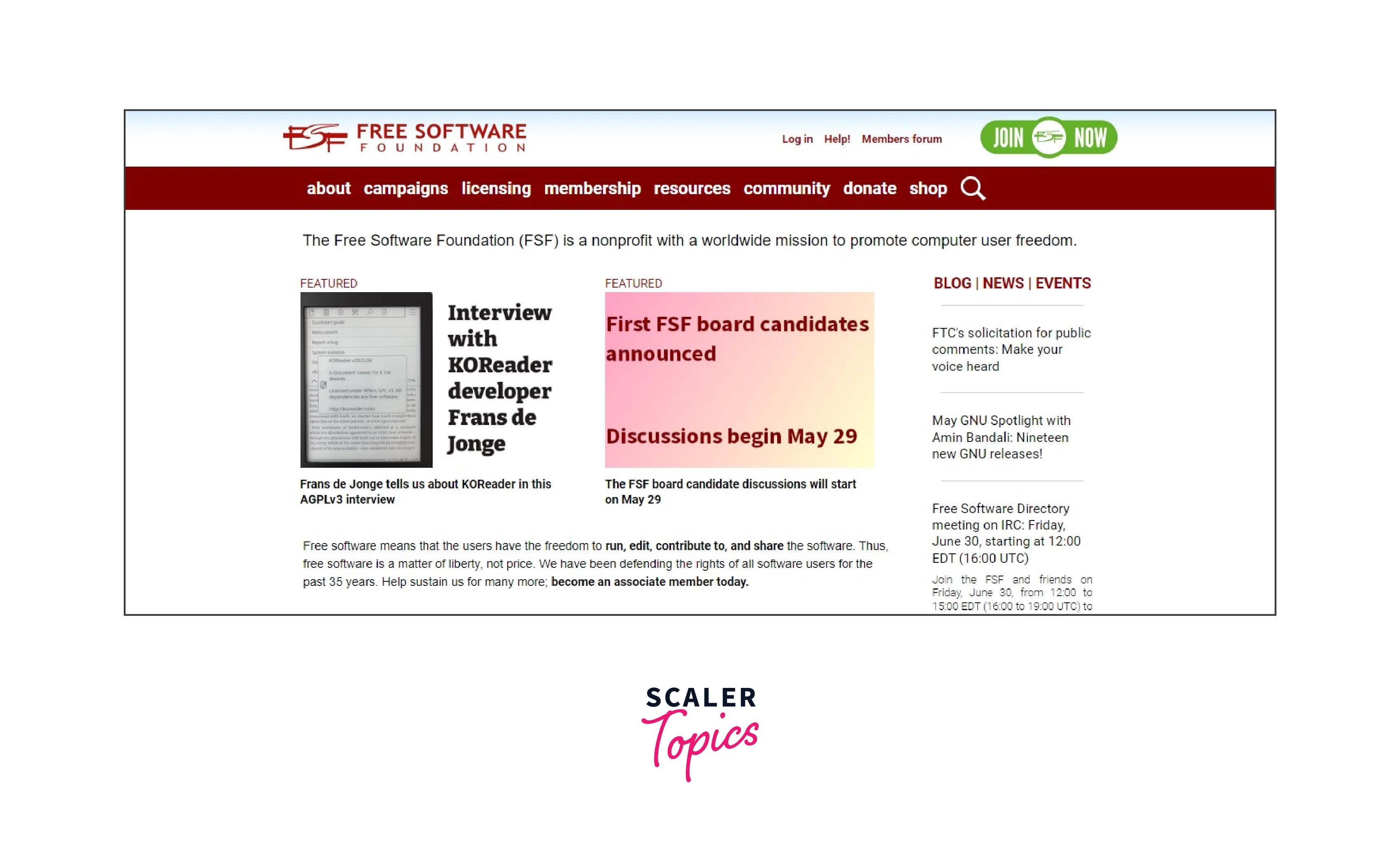What is GNU/Linux?
A combination of the GNU operating system with the Linux kernel is known as GNU Linux. The GNU operating system was created by the Free Software Foundation (FSF), and it comprises several free and open-source software elements, including text editors, compilers, libraries, and utilities.
On the other hand, the Linux kernel is a crucial component of the operating system that communicates with the hardware and controls system resources. It was developed in 1991 by Linus Torvalds and is free and open source.
Each of these components comes together to form the full operating system known as GNU Linux or just Linux. The Linux kernel manages low-level system functions, while the GNU utilities offer a user-friendly command-line interface.
Due to its stability, security, versatility, and the abundance of software available for it, GNU Linux has grown in popularity as a platform for servers, personal computers, mobile devices, embedded systems, and a variety of other devices.

How is GNU/Linux Used?
GNU Linux is utilized on many different platforms and in a variety of configurations. Here are a few such use scenarios:
Desktop and laptop computers: GNU Linux is a widely used primary operating system for personal computers among many people and organizations. Numerous Linux distributions (distros), including Ubuntu, Fedora, Debian, and Linux Mint, are accessible and accommodate various user preferences and requirements.
Servers: Due to its reliability, security, and capacity for handling enormous workloads, GNU Linux is frequently used as a server operating system. Most web servers, database servers, file servers, cloud infrastructure, and networking hardware are powered by it.
Mobile devices: Although Android utilizes a separate software stack and is not commonly referred to as GNU Linux, it is built on the Linux kernel. But there are GNU Linux variants created especially for mobile devices, such as postmarketOS and Ubuntu Touch, that offer a complete Linux experience on smartphones and tablets.
Development and Programming: Due to its robust command-line tools, broad programming language support, and development environments, GNU Linux is favored by many developers and programmers for software development. Compilers, interpreters, editors, version control systems, and debugging tools make up its robust development ecosystem.
These are just a few examples of how GNU Linux is utilized, but due to its adaptability and versatility, it may be used in a wide range of additional situations depending on particular needs and preferences.
What are the Advantages of GNU/Linux?
GNU Linux offers several advantages that contribute to its popularity and widespread usage:
Stability and Reliability: GNU Linux is well regarded for its stability and dependability. An operating system that is dependable and can run for lengthy periods without needing to be rebooted
Security: When compared to other operating systems, GNU Linux is fundamentally more secure. GNU Linux's open-source nature enables a sizable development community to review the source code, spot flaws, and swiftly fix them.
Customization and Flexibility: GNU Linux offers a high degree of customization and flexibility. Users can choose from a large selection of distributions to choose the one that best meets their requirements, whether it is a feature-rich distribution for power users or a lightweight distro for older systems.
Community and Support: The user and developer communities of GNU Linux are enthusiastic and supportive. Online discussion boards, email lists, and conversations offer assistance and direction to both novice and seasoned users.
Cost-effectiveness: Since GNU Linux is frequently offered for free, it greatly lowers operational costs, especially for enterprises and organizations. It does away with the requirement for pricey software licenses, freeing up resources for use in other areas.
What are the Disadvantages of GNU/Linux?
While GNU Linux has numerous advantages, it also has some disadvantages that may be worth considering:
Learning Curve: Users who are unfamiliar with the command-line interface might experience a learning curve while switching from other operating systems to GNU Linux. Some tasks can need familiarity with particular commands or configuration files, which can be difficult for new users at first.
Hardware and Software Compatibility: Although GNU Linux has a large software ecosystem, it might not have as many commercial software options as some other operating systems. It's possible that Linux versions of some specialized or industry-specific applications don't exist or have only a few functionalities.
Gaming Support: Although GNU Linux gaming has advanced significantly in recent years, there are still not as many mainstream commercial games available as there are on other platforms.
Technical Support: The GNU Linux community is renowned for its helpfulness, but in comparison to commercial operating systems, expert technical support could be harder to come by. Organizations or people who depend substantially on prompt assistance and support may want to think about hiring consulting or support services.
User Interface Consistency: Due to the wide variety of desktop environments offered by GNU Linux, the user interface and user experience may change between various distributions. When switching between distributions, or even between different versions of the same distribution, this lack of uniformity may force users to adjust to various interfaces.
What is the Free Software Foundation?
The Free Software Foundation (FSF) is a non-profit organization founded in 1985 by Richard Stallman. It is dedicated to promoting and defending the principles of software freedom. The FSF advocates for the use, distribution, and modification of software that respects the users' freedom to run, study, share, and modify it.
The FSF is known for its development of the GNU Project, which aims to create a complete, free, and open-source operating system called GNU. Although the GNU Project's initial goal was to build a free Unix-like operating system, it later combined with the Linux kernel to create the GNU Linux operating system, commonly referred to as Linux.
The FSF's mission is centered around the philosophy of free software, which emphasizes users' rights to control their computing and promotes collaboration, transparency, and sharing of software source code. It campaigns against restrictive software licenses, such as proprietary software licenses, and advocates for the use of free software licenses like the GNU General Public License (GPL).

Initiatives of FSF
The `Free Software Foundation (FSF) drives initiatives to advance software freedom, including significant contributions to GNU Linux. It develops the GNU Project, aiming to create a free and complete operating system. The FSF promotes the adoption of free software, advocating for user freedoms and emphasizing the use of licenses like the GNU GPL.
It also defends software freedom through legal actions and campaigns against restrictive practices. Additionally, the FSF raises awareness, supports the community, and organizes events to foster collaboration and educate about the benefits of GNU Linux and free software.
Conclusion
-
GNU Linux is an operating system that combines the GNU operating system developed by the Free Software Foundation (FSF) and the Linux kernel.
-
It offers stability, security, flexibility, and a vast software ecosystem.
-
GNU Linux is used in various contexts, including desktop and laptop computers, servers, embedded systems, scientific research, mobile devices, and software development.
-
The FSF, through its initiatives, promotes software freedom, defends user rights, raises awareness, and supports the GNU Linux community.
